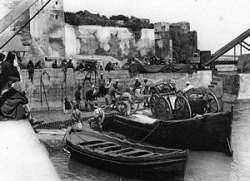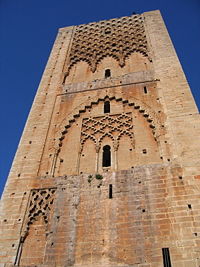History
Prehisoric Morocco
While little is known about Morocco settlement in these early times, excavations elsewhere suggest an abundance of game and forests that would have been hospitable to mesolithic Homo sapiens hunters and gatherers.
Early Century Morocco
By the 2nd century B.C., several large, although loosely administered, Berber kingdoms had emerged. After the fall of Morocco's main city, Carthage, the area was annexed to the Roman Empire in A.D. 40. Rome controlled the vast, ill-defined territory through alliances with the tribes rather than through military occupation.
Christianity was introduced in the second century and gained converts in the towns and among slaves and Berber farmers. By the end of the 4th century, the Romanized areas had been Christianized. The area had a substantial Jewish population as well.
Arabs conquered the region in the 7th century, bringing their civilization and Islam, to which many of the Berbers converted. Arab conquerors converted the indigenous Berber population to Islam, but Berber tribes retained their customary laws. The Arabs saw the Berbers as barbarians, while the Berbers often saw the Arabs as only an arrogant and brutal soldiery bent on collecting taxes. Once established as Muslims, the Berbers shaped Islam in their own image and embraced Muslim laws as a way of breaking away from Arab control.
Europen Influence on Morocco
In the 18th and 19th Morocco kept it's independence while other states in the region fell to Turkish, French, or British domination. However, in the latter part of the 19th century Morocco’s weakness and instability invited European intervention to protect threatened investments and to demand economic concessions. The first years of the 20th century witnessed a rush of diplomatic maneuvering through which the European powers and France in particular furthered their interests in North Africa. Disputes over Moroccan sovereignty were links in the chain of events that led to World War I.
Morocco's Independence
In late 1955, Mohammed V successfully negotiated the gradual restoration of Moroccan independence within a framework of French-Moroccan interdependence. The sultan agreed to institute reforms that would transform Morocco into a constitutional monarchy with a democratic form of government. In February 1956, Morocco acquired limited home rule. Further negotiations for full independence culminated in the French-Moroccan Agreement signed in Paris on March 2, 1956. On April 7 of that year France officially relinquished its protectorate in Morocco. The abolition of the Spanish protectorate and the recognition of Moroccan independence by Spain were negotiated separately and made final in the Joint Declaration of April 1956. Through this agreement with Spain in 1956 and another in 1958, Moroccan control over certain Spanish-ruled areas was restored, though attempts to claim other Spanish possessions through military action were less successful.




